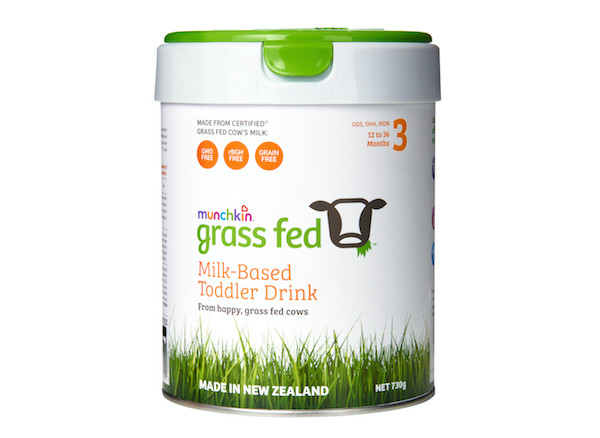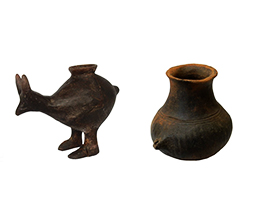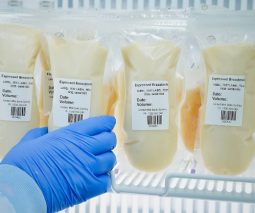Is grass fed toddler milk formula the cream of the crop?

When it comes to toddler milk, all formulas are not created equal. Some come from cows, others goats; some are organic and others are sourced from grass fed cows. We’ve chatted to a nutritionist to find out exactly what grass fed formula is, and how it can help little ones.
Mandy Sacher is a paediatric nutritionist and the founder of Wholesome Child (we’ve previously featured some of her delicious lunchbox recipes!), and she also knows her toddler formulas. So we enlisted her help to get the lowdown on grass fed toddler formula.
What is grass fed milk?
Mandy explains that 100 percent grass fed milk comes from cows that are exclusively fed a diet of grass, plants and shrubs, which she says is actually a cow’s preferred diet.
“Modern farming practices today see the feed of most dairy cows supplemented with grain, corn and soy based foods, which can expose cows to GM ingredients and impact the nutritional properties of the milk itself. When cows are fed a 100 percent grass fed diet, the milk not only offers a fuller richer flavour, but has been proven to combine a range of added nutritional benefits. A good way to think of it is when cows are fed a nutrient rich diet (like grass) they are healthier and will be able to produce a higher grade quality of milk.”
Is there a difference between organic and grass fed?
“The main difference between organic and grass fed milk is in relation to the way a cow is fed,” Mandy points out. “Certified organic milk can come from cows that feed on certified organic grain, whereas only grass fed milk specifies that the milk must come from cows that feed on grass, plants and shrubs exclusively.”

What are the key benefits of grass fed as opposed to grain?
Mandy says 100 percent grass fed milk “contains multiple nutritional benefits when compared to the milk produced from cows fed a grain based diet”. For toddlers this includes:
- Up to five times the naturally occurring conjugated linoleic acid (CLA). CLA is a fat also found in breast milk and has various benefits for toddlers including boosting the immune system, improved bone mass and controlling blood sugar levels.
- Higher levels of beta carotene from grazing on natural pastures, assisting with immune health, visual health and fat metabolism.
- Increased levels of antioxidants such as vitamin E.
- Higher levels of minerals and vitamins.
- A healthier ratio of omega-6 to omega-3 fatty acids.
- Further, cows on a 100 percent grass fed diet do not consume genetically modified ingredients like corn, soy or canola oil, which makes their milk naturally GMO-free.
Is this just a new buzz phrase, or have the benefits of grass fed been proven over time?
“Ensuring cows are raised on their preferred natural diet of grass is not a new phenomenon at all. The livestock industry has long recognised the superior quality of grass fed beef, as have the benefits of grass fed milk been experienced by the dairy industry,” Mandy explains.
How important is the source of the milk to the quality of toddler formulas?
Mandy highlights that, on average, up to 65 percent of a formula is made up of milk and milk by-products.
“This makes the quality and source of milk used in any formula of paramount importance. While it can be confusing with so many options available, mums really need to do their research and to first identify whether toddler milk is right for their child and then to make sure the formula they are offering their toddlers is made from a high grade quality milk. Munchkin Grass Fed Toddler is a step in the right direction for the industry and hopefully provides parents with greater choice when it comes to choosing the best formula for their little ones.”
Munchkin Grass Fed is fortified with probiotics – why is it important to choose a probiotic formula?
“One of the main benefits of breast milk is that it is saturated with beneficial bacteria, which influences the state of a baby’s health. A healthy gut (microbiome) is the cornerstone of good health in young children. A formula supplemented with probiotics, or prebiotics can help maintain a healthy microbiome in toddlers.”
Does the amount of grass in a cow’s diet matter and why is 100 percent grass fed important?
“In general the more grass present in the diet of a cow, the higher the nutritional output of that milk will likely be. With that in mind, looking out for a 100 per cent grass fed distinction is important as this means that a cow is not only fed grass as part of their diet, but rather this is what makes up their diet exclusively. A 100 percent grass fed stamp ensures that the milk is of a high quality, combining all the nutritional benefits offered by grass fed milk.”

Munchkin Grass Fed Milk-Based Toddler Drink is the only toddler milk drink in the world that’s made from 100 percent New Zealand grass fed cows, which makes the milk GMO free, rBGH free, and grain free. It’s also packed with vitamins A, E, CLA, and beta carotene and essential fatty acids.
And here’s a little about the cows from across the pond who supply milk for Munchkin: they roam freely on pasture every day, and are milked once or twice a day – Munchkin believes its grass fed cows are happy and healthy, and in turn this creates a milk drink that’s top quality.
Munchkin Grass Fed is available in Coles supermarkets and select pharmacies nationwide. For more information, to buy online or to find your local stockist, head over to Munchkin. You can also connect with Munchkin on Facebook and Instagram.
(This is a sponsored post for Munchkin)









